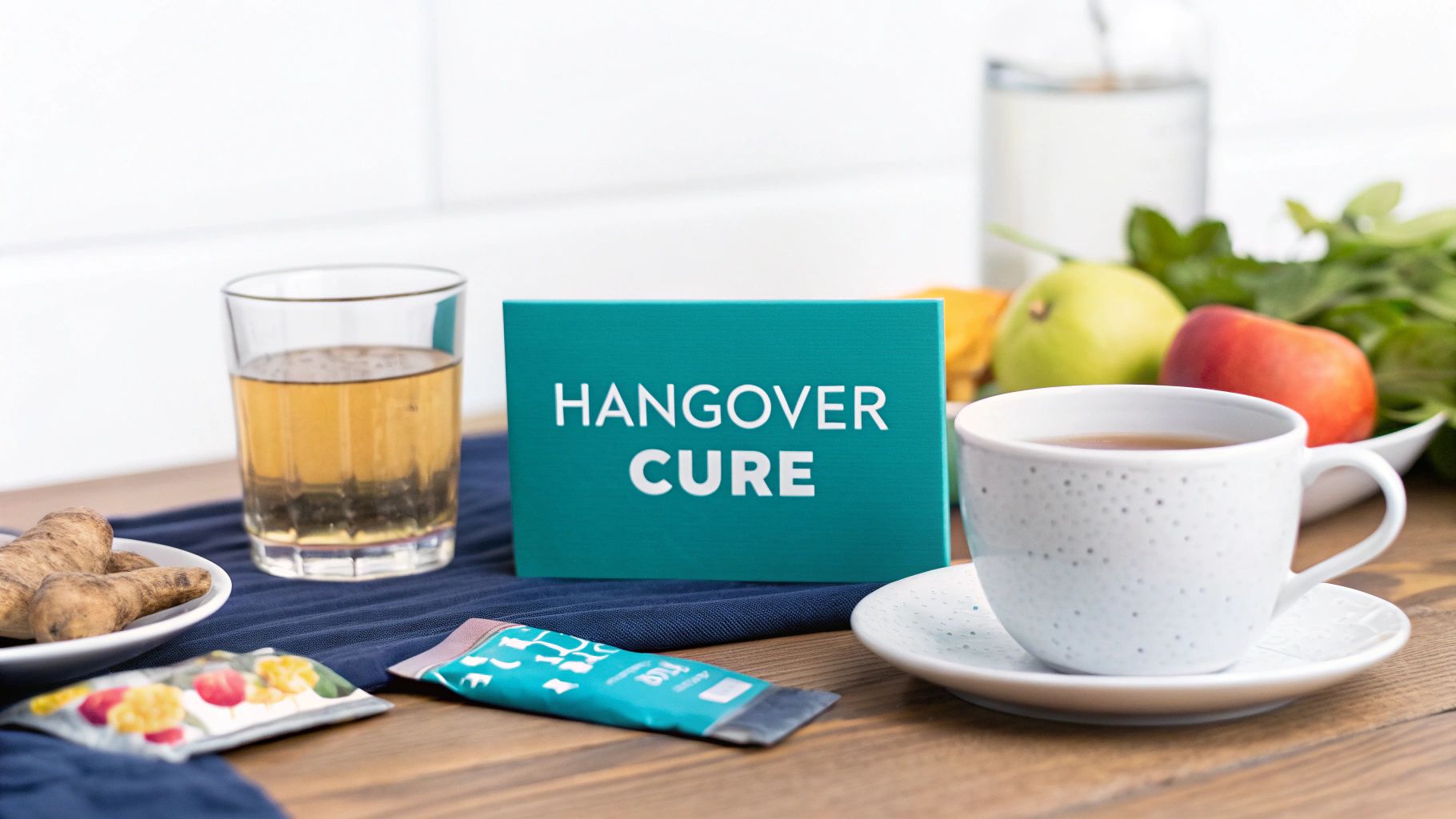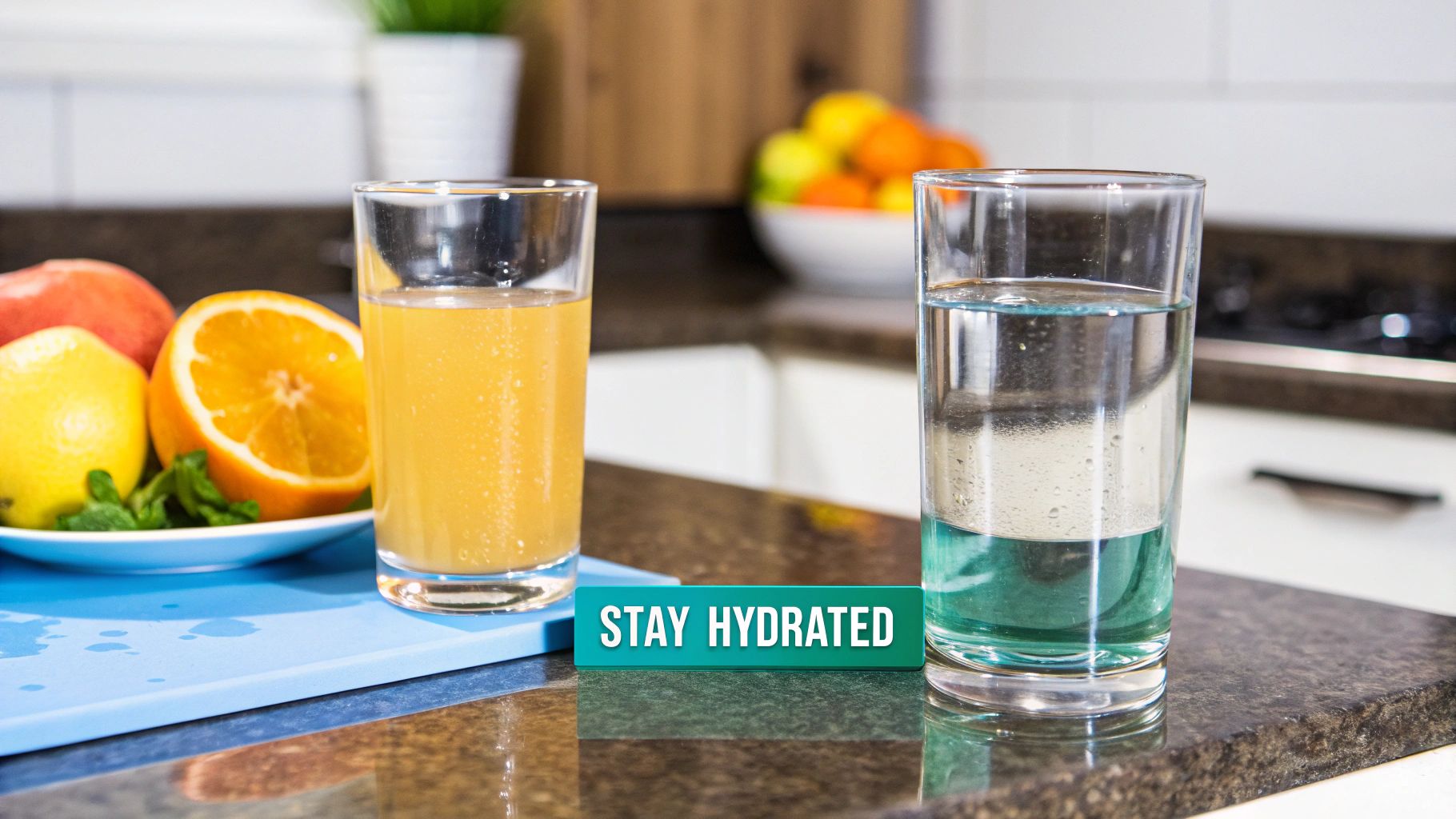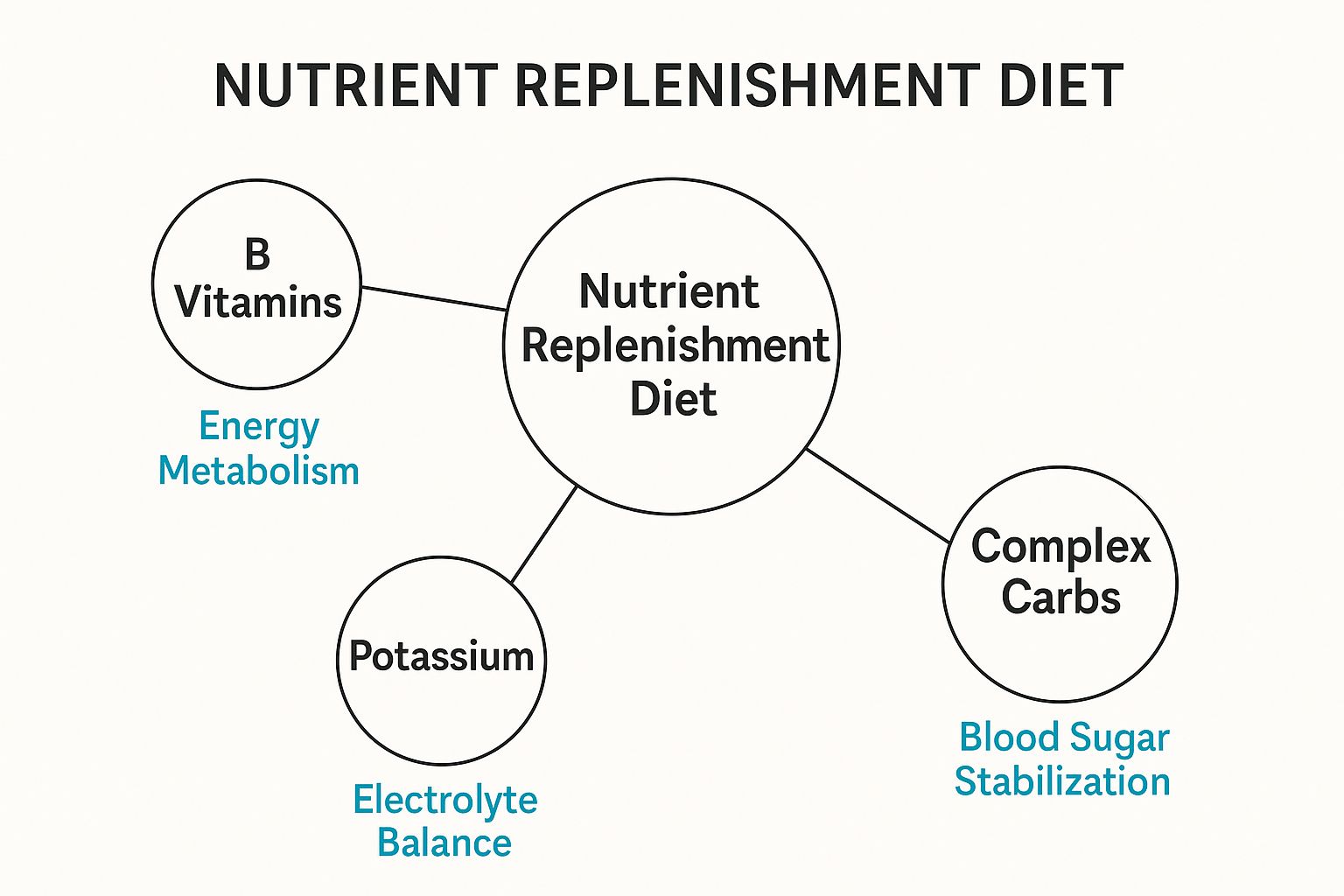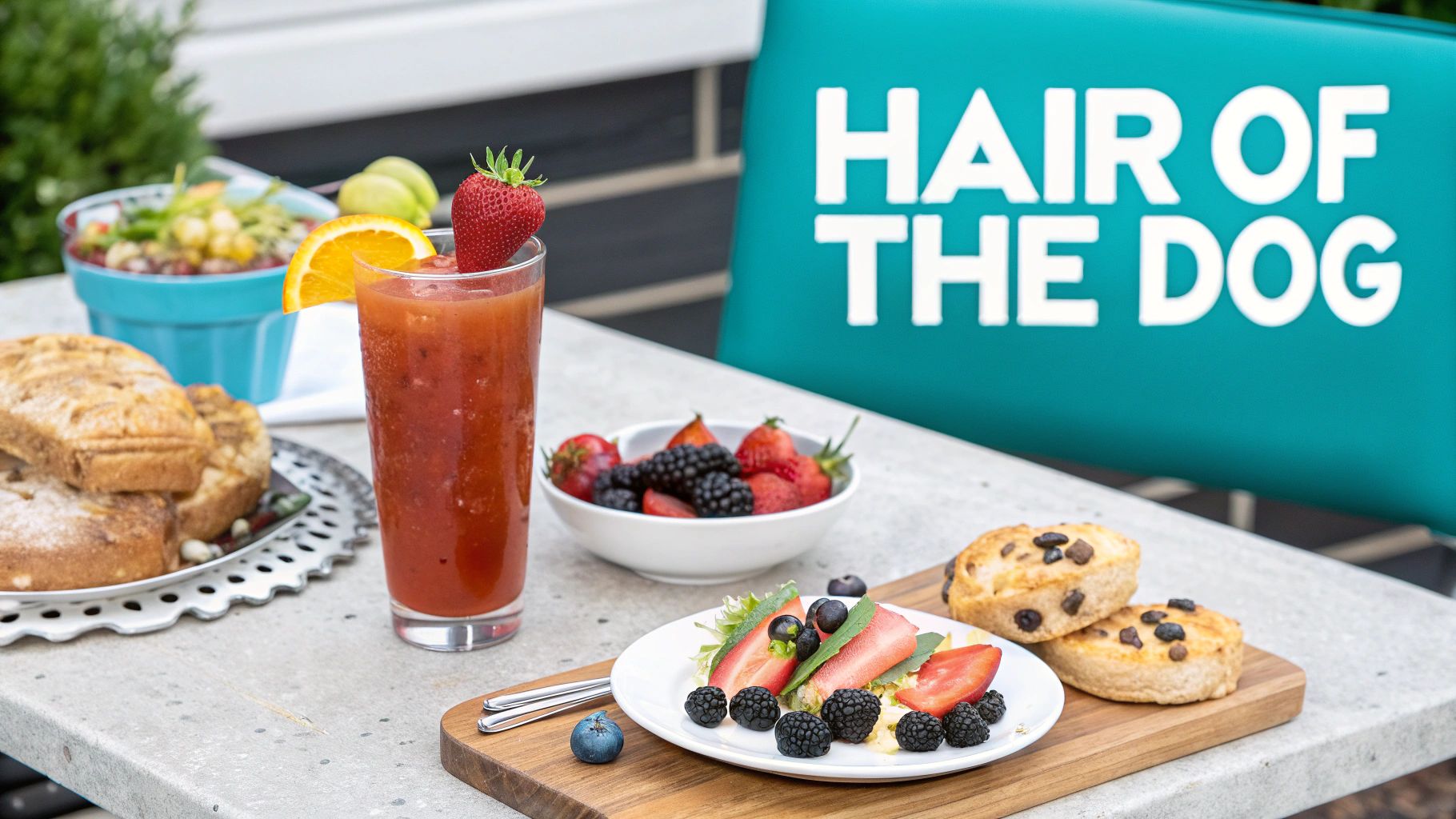

· By Annemarie
How to Cure a Hangover Fast: 7 Quick Remedies
Waking up with a hangover is the worst!
Hangovers can ruin your day. Whether it's a pounding headache or nausea, that post-party regret is real. This listicle offers seven effective ways to cure a hangover fast, helping you bounce back quickly. Learn how hydration therapy, anti-inflammatory pain relievers, a nutrient-rich diet, rest, exercise, the "hair of the dog," and supplements can alleviate your symptoms. These simple strategies offer practical solutions to get you feeling better and back on your feet. Let's dive in!
1. Hydration Therapy
One of the fastest ways to cure a hangover is through hydration therapy. This method focuses on replenishing the fluids and electrolytes lost due to alcohol's dehydrating effects. Alcohol acts as a diuretic, increasing urination and leading to dehydration, a primary culprit behind common hangover symptoms like headache, fatigue, and dizziness. Proper rehydration helps flush toxins from your system and restore normal bodily functions, offering a relatively quick path back to feeling your best. Hydration therapy works by addressing this fundamental physiological imbalance, helping your body recover from the effects of alcohol.

Hydration therapy can take several forms, from simple at-home remedies to professional medical interventions. Replenishing essential fluids and restoring the balance of electrolytes like sodium, potassium, and magnesium are key to this approach. You can achieve this through drinking plenty of water, consuming sports drinks designed to replenish electrolytes, or using oral rehydration solutions. For more severe cases, IV hydration therapy is available in some medical settings and specialized hangover clinics. This method delivers fluids and electrolytes directly into the bloodstream, providing rapid relief. Popularized by services like the 'Hangover Club' and 'Reviv', as well as the clever marketing of Pedialyte for adult hangover recovery, IV therapy has become a go-to for some seeking a quick fix. However, its high cost ($100-300 per session) makes it less accessible than other hydration methods.
For those looking for how to cure a hangover fast at home, simple strategies can be remarkably effective. Drinking 16-20 ounces of water before bed after consuming alcohol can preemptively mitigate dehydration. Alternating alcoholic beverages with water throughout the night is another smart preventative measure. Even better, learn more about Hydration Therapy to explore a range of effective rehydration strategies. Adding a pinch of salt to your water can improve absorption, and room-temperature water is often absorbed more efficiently than ice-cold water. Coconut water is another excellent natural source of electrolytes. Aim for clear or light yellow urine as an indicator of adequate hydration.
Pros:
- Addresses a primary physiological cause of hangovers (dehydration).
- Can provide relatively quick relief for some symptoms.
- No significant side effects.
- Easy and affordable to implement at home.
Cons:
- Not a complete solution for all hangover symptoms (e.g., nausea).
- Professional IV hydration can be expensive.
- Takes time to fully rehydrate the body.
- May require frequent bathroom trips.
Whether you are a social drinker, nightlife enthusiast, busy professional, frequent traveler, or simply a health-conscious individual looking to minimize the after-effects of occasional alcohol consumption, understanding the importance of hydration is crucial. While hydration therapy may not magically erase every hangover symptom, it is a fundamental step in the recovery process and a crucial element in any strategy aimed at how to cure a hangover fast.
2. Anti-Inflammatory Pain Relievers
Waking up with a pounding headache and aching body after a night of fun is a common experience. If you're looking for how to cure a hangover fast, anti-inflammatory pain relievers can offer some much-needed relief. These medications, specifically Non-Steroidal Anti-Inflammatory Drugs (NSAIDs) like ibuprofen and naproxen sodium, directly address the inflammation that contributes to many hangover symptoms. Alcohol consumption triggers inflammatory responses throughout the body, leading to headaches, muscle aches, and overall discomfort. NSAIDs work by inhibiting the production of prostaglandins, chemicals that promote inflammation, pain, and fever. This helps to alleviate the physical symptoms while your body processes the remaining alcohol.
Why This Works for Hangovers: This approach deserves a spot on the "cure a hangover fast" list because it targets a root cause of hangover discomfort: inflammation. Rather than just masking the pain, NSAIDs tackle the underlying biological processes contributing to your misery. This translates to faster, more effective relief than some other hangover remedies.
Features and Benefits:
- Reduces headaches and body pain: NSAIDs effectively alleviate the throbbing headaches and muscle aches commonly associated with hangovers.
- Decreases inflammation: They target the inflammatory response triggered by alcohol, addressing the source of the discomfort.
- Over-the-counter availability: Ibuprofen (Advil, Motrin) and naproxen sodium (Aleve) are widely available and affordable without a prescription.
- Variety of forms: You can find these medications in pills, liqui-gels, and other forms to suit your preference.
Pros:
- Fast-acting relief: NSAIDs can provide relatively quick relief from pain symptoms.
- Widely available and affordable: They are easily accessible and budget-friendly.
- Scientifically proven anti-inflammatory effects: Numerous studies support their effectiveness in reducing inflammation.
- Can be taken preventatively: Taking a dose of ibuprofen before bed after drinking can help mitigate the severity of your hangover.
Cons:
- Stomach irritation: NSAIDs can cause stomach upset, especially if taken on an empty stomach or while alcohol is still in your system. Always take with food.
- Not recommended for everyone: Individuals with certain medical conditions, like ulcers or kidney problems, should avoid NSAIDs. Consult your doctor if you have any concerns.
- Masks symptoms, not the cause: While they address inflammation, they don't speed up alcohol processing.
- Not a regular solution: Overusing NSAIDs can have negative health consequences. They should be used sparingly for hangover relief.
- Avoid Acetaminophen: Do not take acetaminophen (Tylenol) with alcohol or while alcohol is still present in your system due to increased risk of liver damage.
Examples of Successful Implementation:
- Taking 400mg of ibuprofen before bed after drinking.
- Using ibuprofen with food the morning after drinking.
- Combining ibuprofen with caffeine for enhanced headache relief (some over-the-counter remedies combine these).
- Specialized hangover formulations like Blowfish (an FDA-approved combination of aspirin and caffeine) can be effective but still carry the risks associated with NSAIDs.
Actionable Tips:
- Always take with food: This helps to minimize potential stomach irritation.
- Avoid acetaminophen (Tylenol): Opt for ibuprofen or naproxen sodium instead.
- Don't exceed recommended dosages: Follow the instructions on the medication packaging.
- Wait until blood alcohol levels have decreased significantly: Taking NSAIDs while heavily intoxicated can worsen stomach upset.
- Combine with hydration: Drinking plenty of water is crucial for hangover recovery and enhances the effectiveness of pain relievers.
Popularized By:
- Blowfish for Hangovers (FDA-approved hangover remedy)
- Medical professionals recommending ibuprofen over acetaminophen for hangovers
- Various hangover-specific formulations in the wellness market
By understanding how anti-inflammatory pain relievers work and using them responsibly, you can effectively alleviate some of the most unpleasant hangover symptoms and get back to feeling your best. Remember, however, that moderation is key, and the best way to avoid a hangover is to drink responsibly in the first place.
3. Nutrient Replenishment Diet
Battling a hangover? While a quick fix might be tempting, a nutrient replenishment diet offers a more sustainable and holistic approach to how to cure a hangover fast. This strategy involves consuming specific foods that replenish the vitamins and minerals depleted by alcohol, stabilize blood sugar, and support liver function. Alcohol disrupts your body's natural balance by depleting essential nutrients like B vitamins and throwing off blood glucose levels. A nutrient-focused diet helps restore this balance, provides sustained energy, and supports your body's natural recovery processes. It addresses the root causes of your hangover rather than just masking the symptoms.

The infographic visualizes the core concept of hangover recovery through nutrient replenishment. The central idea, "Hangover Recovery," branches out to three key supporting concepts: "Replenish Depleted Nutrients," "Stabilize Blood Sugar," and "Support Liver Function." These concepts are further connected to specific nutrients and food groups. For instance, "Replenish Depleted Nutrients" links to B vitamins, potassium, and magnesium, suggesting foods like bananas and leafy greens. "Stabilize Blood Sugar" emphasizes complex carbohydrates and protein, visually represented by images of whole grains and eggs. Finally, "Support Liver Function" connects to antioxidants and hydration, pointing to foods like berries and, of course, water. The infographic highlights the interconnectedness of these elements in achieving effective hangover recovery. It clearly shows how addressing each aspect through targeted nutrition contributes to overall well-being.
This method deserves a spot on this list due to its multifaceted approach. It focuses on easily digestible, nutrient-rich foods targeting depleted resources like B vitamins, potassium, magnesium, and more. Including proteins helps stabilize blood sugar, while anti-inflammatory ingredients further aid recovery. Examples of nutrient-replenishing meals include Korean haejangguk (hangover soup), a traditional English breakfast, banana and honey smoothies with ginger, avocado toast with eggs, and miso soup with tofu. These meals offer a diverse range of flavors and ingredients to cater to various preferences.
Pros:
- Addresses multiple physiological aspects of hangovers.
- Provides sustainable energy rather than quick fixes.
- Has broader health benefits beyond hangover relief.
- Can be customized based on food preferences.
- No negative side effects when using whole foods.
Cons:
- Takes longer to provide relief than some other methods.
- Requires preparation and appetite (which may be lacking).
- Effectiveness varies based on hangover severity.
- Some recommended foods may be unappealing when nauseated.
Tips for Implementing a Nutrient Replenishment Diet:
- Start with a small portion if you're feeling nauseated.
- Consume a balanced meal before drinking to protect your stomach lining.
- Eat a light, carbohydrate-rich snack before bed after drinking.
- Focus on foods rich in potassium (bananas, potatoes) and B vitamins (eggs, whole grains).
- Include sources of cysteine (eggs, oats) to help break down acetaldehyde, a toxic byproduct of alcohol metabolism.
- Add ginger or peppermint to help with nausea.
This approach is especially beneficial for health-conscious individuals, busy professionals, and frequent travelers who want a sustainable way to manage hangovers without resorting to potentially harmful quick fixes. The nutrient replenishment diet isn't just a temporary solution; it promotes overall health and well-being. Learn more about Nutrient Replenishment Diet to understand the science behind it. Whether you're a social drinker, a nightlife enthusiast, or simply someone who wants to bounce back quickly after an occasional indulgence, incorporating this dietary strategy can make a significant difference in how you experience and recover from a hangover.
4. Sleep and Rest Recovery
When searching for how to cure a hangover fast, sometimes the simplest solution is the most effective. Sleep and rest recovery is a fundamental approach to bouncing back from a night of overindulgence. It leverages your body's natural detoxification and healing processes to efficiently address the after-effects of alcohol. Why does this work? Alcohol, even if it initially seems to help you fall asleep, significantly disrupts sleep architecture and quality. Prioritizing restorative sleep after drinking gives your liver the uninterrupted time it needs to process alcohol metabolites, allows your body to rehydrate, and helps normalize the hormonal and neurological systems disrupted by alcohol.
This method addresses multiple aspects of hangover physiology simultaneously. Specifically, it gives your liver time to metabolize alcohol byproducts, helps restore normal hormonal balance, and reduces the perception of hangover symptoms simply by reducing consciousness. The beauty of this approach is that it's completely natural, requiring no additional substances and having no financial cost. It also benefits your overall health beyond hangover recovery.
Think about it: the concept of "sleeping it off" is widely practiced across cultures, from the traditional Sunday rest day after Saturday night socializing to the napping strategies employed by college students and young professionals. Taking a "recovery day" after major celebrations like New Year's Eve is another common example of how prioritizing rest can help alleviate hangover symptoms.
While rest is a powerful tool, it's not without its drawbacks. It's time-consuming and not always practical depending on schedule obligations. It may also be difficult to achieve quality sleep while hungover, and it certainly doesn't provide immediate symptom relief.
Here are some tips to maximize the benefits of sleep and rest for hangover recovery:
- Create an ideal sleep environment: A cool, dark, and quiet environment is crucial for optimal sleep quality. Use a humidifier to counteract dehydration while sleeping.
- Optimize your sleep position: Position your body with your head slightly elevated to reduce headache pressure.
- Prepare your body for sleep: Take a warm shower before bed to improve circulation.
- Minimize distractions: Remove electronic distractions and use sleep masks and earplugs if needed.
- Strategic napping: If a full night's sleep isn't possible, schedule recovery naps between 20-30 minutes (power nap) or for a full 90-minute sleep cycle.
- Extend sleep duration: Stay in bed longer than usual if your schedule permits.
Quality sleep plays a crucial role in recovering from a hangover by allowing your body to repair itself. If you're struggling to get enough restful sleep, check out this article on how to sleep better. This resource from Whelm offers eight science-backed tips for restful nights.
The emphasis on sleep for hangover recovery has been popularized by sleep researchers highlighting alcohol's negative impact on sleep quality, wellness influencers promoting "sleep hygiene" for recovery, and mental health professionals advocating rest as a key component of hangover treatment. Even sleep tracking apps now commonly show disrupted patterns after alcohol consumption, further emphasizing the importance of rest in the recovery process. So, the next time you're looking for how to cure a hangover fast, remember that prioritizing sleep and rest can be a highly effective, natural, and cost-free way to help your body recover.
5. Exercise and Sweat Therapy
While it might seem counterintuitive to exert yourself when nursing a hangover, light to moderate exercise can be a surprisingly effective way to how to cure a hangover fast. This approach focuses on increasing circulation, releasing endorphins, and potentially accelerating the elimination of toxins through sweating. Exercise helps deliver oxygen throughout your body, stimulates your metabolism – which could speed alcohol processing – and can improve your mental outlook through the release of natural mood-enhancing compounds. Although this method remains somewhat controversial among hangover remedies, many find that pushing through the initial discomfort can lead to significantly faster recovery.

This method deserves a place on this list due to its potential to address multiple hangover symptoms simultaneously. It increases blood circulation and oxygen delivery, vital for restoring normal bodily functions after a night of drinking. Furthermore, it stimulates endorphin release for natural pain relief and promotes sweating, which may help eliminate toxins. It can also regulate blood sugar levels disrupted by alcohol consumption.
Examples of Exercise and Sweat Therapy for Hangovers:
- The "sweat it out" approach: Often used by athletes and fitness enthusiasts, this involves moderate-intensity cardio.
- Hangover yoga: Morning yoga sessions specifically designed for hangover recovery focus on gentle stretches and deep breathing.
- Light jogging: Promoted by some health influencers as a hangover cure, a light jog can boost circulation and mood.
- Sauna or steam room sessions: A tradition in Scandinavian countries, this method combines heat therapy with sweating.
- Hot yoga: Combines rehydration (through sweating) with the therapeutic benefits of yoga.
Pros:
- Can improve mental outlook and reduce anxiety.
- Potentially shortens overall hangover duration.
- Has additional health benefits beyond hangover relief.
- Free and accessible to most people.
- Can help restore normal sleep patterns.
Cons:
- Initially uncomfortable and requires willpower.
- Can worsen dehydration if fluids aren't replaced.
- Not recommended for severe hangovers or when still intoxicated.
- Scientific evidence is mixed on effectiveness.
- May be dangerous with certain hangover symptoms (dizziness, nausea).
Tips for Effective Hangover Exercise:
- Start slow: Begin with very light activity like walking or gentle stretching.
- Hydrate: Drink plenty of fluids before, during, and after exercise. Consider electrolyte replacement during your workout.
- Listen to your body: Stop if dizziness or nausea worsens.
- Timing is key: Time your workout for mid-morning after some initial recovery.
- Moderate intensity: Focus on activities that elevate your heart rate moderately, not intensely.
- Fresh air: Try outdoor activities for the added benefit of fresh air.
Who Popularized It?
The "sweat it out" philosophy has been popularized by fitness influencers, celebrity trainers sharing hangover workout routines, and sports figures discussing their recovery techniques. Wellness spas offering "detox" workout sessions and the sauna culture in Finland and other Nordic countries also contribute to this method's popularity.
This approach is particularly suited for health-conscious individuals, busy professionals, and frequent travelers who are looking for a proactive and readily available method to combat hangovers. However, it's crucial to remember that this method isn’t for everyone. Listen to your body and prioritize hydration. If you’re experiencing a severe hangover or other concerning symptoms, consult a healthcare professional before attempting any exercise.
6. Hair of the Dog Method
The "hair of the dog" method, a somewhat controversial approach to curing a hangover fast, involves consuming a small amount of alcohol the morning after a night of heavy drinking. The theory behind this method is that some hangover symptoms are a result of mild alcohol withdrawal. By introducing a small amount of alcohol back into the system, you temporarily alleviate these withdrawal symptoms. This method often involves "hangover cures" like Bloody Marys, Mimosas, or even just a beer, frequently enjoyed during brunch or other morning social activities.

While a mimosa might offer temporary relief, it's important to understand that this method doesn't actually cure a hangover. Instead, it merely postpones the inevitable. By requiring your body to process more alcohol, you delay the recovery process and potentially perpetuate unhealthy drinking patterns. This approach deserves a place on this list because it's a commonly practiced method, and understanding its pros and cons is crucial for making informed decisions about hangover recovery. It’s a cultural phenomenon, popularized by literary figures like Hemingway, normalized by brunch culture, and reinforced by media portrayals of morning-after drinking. The phrase itself has intriguing origins, stemming from a medieval belief about rabies cures.
Pros:
- Temporary Relief: Can temporarily alleviate some withdrawal symptoms like headache and nausea.
- Social Lubricant: Can make morning social obligations more manageable.
- Nutritional Benefits (Sometimes): Some traditional "hair of the dog" drinks, like Bloody Marys, contain ingredients like tomato juice and spices that offer some nutritional value.
- Psychological Comfort: For some, the ritual and familiarity can provide a psychological comfort factor.
Cons:
- Delayed Recovery: Postpones the body's natural detoxification process.
- Risk of Dependency: Can contribute to unhealthy drinking habits and potential alcohol dependency.
- Doesn't Address Root Cause: Fails to address dehydration and nutrient depletion, the underlying causes of a hangover.
- Potential for Day Drinking: Can easily escalate into prolonged drinking throughout the day.
- Not Medically Recommended: Healthcare professionals strongly advise against this method.
- Further Liver Strain: Adds additional burden to the liver, which is already working to process the previous night's alcohol.
Tips for Harm Reduction (If Using This Method):
- Strict Limitation: Limit yourself to one light drink.
- Lower Alcohol Content: Opt for lower alcohol options like beer or diluted cocktails.
- Hydrate Simultaneously: Drink plenty of water or non-alcoholic beverages alongside any alcoholic beverage.
- Nutritional Boost: Choose options with added nutritional benefits, like a Bloody Mary with tomato juice.
- Rare Exception: Use this method only as a rare exception, not as a regular practice.
- Follow Up with Proper Care: After the single drink, focus on rehydration, proper nutrition, and rest to support your body's recovery.
This method is generally not recommended for curing a hangover fast. While it might provide temporary relief, its potential drawbacks outweigh the short-lived benefits. Focus on healthier, more sustainable hangover recovery strategies like rehydration and proper nutrition to get back on your feet quickly and safely.
7. Supplemental Remedies: A Science-Backed Approach to Hangover Relief
If you're looking for a more targeted approach to how to cure a hangover fast, supplemental remedies might be your answer. These vitamins, minerals, herbs, and supplements are specifically formulated to support liver function, reduce inflammation, and replenish the nutrients depleted by alcohol consumption. They work through several mechanisms, including antioxidant protection, detoxification support, anti-inflammatory effects, and metabolic assistance. Many are even available as specific hangover prevention or recovery formulations, offering a convenient way to combat the after-effects of a night out.
These remedies address the specific biochemical pathways disrupted by alcohol. For instance, alcohol depletes B vitamins, which are essential for energy production and detoxification. Supplementation with a B-complex vitamin can help restore these levels. Similarly, N-acetyl cysteine (NAC) is used by medical professionals to support liver detoxification and can help mitigate alcohol's harmful effects. Other ingredients like milk thistle, DHM (dihydromyricetin), and prickly pear extract offer antioxidant and anti-inflammatory benefits, further aiding the body's recovery process. You can find these supplements in various forms, including pills, powders, effervescent tablets, and even patches.
Several brands have capitalized on this approach, offering ready-made solutions. Products like Flyby, Cheers, and Morning Recovery combine various ingredients into convenient packages. DHM (Dihydromyricetin) supplements, derived from the Hovenia Dulcis plant, are based on traditional Chinese medicine and have shown promise in preclinical studies. Similarly, Korean red ginseng preparations are traditionally used for alcohol recovery. Learn more about Supplemental Remedies for a deeper dive into natural hangover remedies.
Pros:
- Addresses specific biochemical pathways affected by alcohol.
- Convenient and portable, making them ideal for travel.
- Some ingredients, like DHM and NAC, have scientific evidence supporting their effectiveness in alcohol metabolism and liver support.
- Can provide targeted nutrient replenishment.
- Many are natural compounds with minimal side effects when taken as directed.
Cons:
- Effectiveness varies widely between products and individuals.
- Quality and potency can be inconsistent across brands.
- Can be more expensive compared to basic hangover remedies.
- The supplement industry faces limited regulation and standardization. While some ingredients have strong scientific backing (like NAC, researched for its liver-protecting properties), others have less robust clinical evidence.
- Not a substitute for moderation and hydration – these remain crucial for preventing hangovers in the first place.
Tips for Using Supplemental Remedies:
- For preventative measures, take supplements before drinking begins for the best results.
- Always follow dosage instructions carefully – more isn't necessarily better.
- Research specific ingredients and their benefits rather than relying solely on marketing claims.
- Combine supplemental remedies with proper hydration and nutrition for optimal recovery.
- Consider liver-supporting herbs like milk thistle and artichoke extract.
- Consult your healthcare provider before taking supplements, especially if you are taking medications or have any chronic health conditions.
The popularity of these remedies has grown, fueled by Silicon Valley entrepreneurs creating science-based hangover supplements, naturopathic doctors promoting herbal remedies, and even celebrity endorsements. University research, such as studies on DHM conducted at UCLA, further contributes to the growing interest in this targeted approach to hangover relief. While supplemental remedies offer a promising avenue for how to cure a hangover fast, remember that they are most effective when combined with responsible alcohol consumption and a healthy lifestyle.
7 Fast Hangover Cure Strategies Compared
| Remedy / Strategy | Implementation Complexity 🔄 | Resource Requirements ⚡ | Expected Outcomes 📊 | Ideal Use Cases 💡 | Key Advantages ⭐ |
|---|---|---|---|---|---|
| Hydration Therapy | Low 🔄 | Low to Moderate ⚡ (water, drinks, IV costly) | Partial symptom relief; rehydrates and restores electrolytes | General hangovers; easy home care; acute dehydration | Quick symptom relief; safe; addresses dehydration |
| Anti-Inflammatory Pain Relievers | Low 🔄 | Low ⚡ (OTC meds) | Fast pain and inflammation relief | Headaches, body aches associated with hangovers | Rapid action; affordable; proven anti-inflammatory |
| Nutrient Replenishment Diet | Moderate 🔄 | Moderate ⚡ (food prep and ingredients) | Sustained recovery; nutrient restoration; energy stabilization | Sustained hangover symptoms; overall health support | Holistic; no side effects; customizable |
| Sleep and Rest Recovery | Low 🔄 | Minimal ⚡ | Natural detoxification; hormonal balance; symptom reduction | When time and ability to rest available | Completely natural; no cost; wide health benefits |
| Exercise and Sweat Therapy | Moderate 🔄 | Low ⚡ (requires no special equipment) | Mental uplift; possible speeded toxin processing | Mild hangovers; active individuals seeking faster recovery | Mood boost; metabolism stimulation; free |
| Hair of the Dog Method | Low 🔄 | Low ⚡ (alcohol needed) | Temporary symptom relief; delayed full recovery | Occasional social situations needing quick relief | Short-term relief; social/psychological comfort |
| Supplemental Remedies | Moderate 🔄 | Moderate to High ⚡ (supplements cost) | Targeted nutrient replenishment; biochemical support | Prevention and post-drinking recovery | Specific pathways targeted; portable; some scientific support |
Ready to say goodbye to hangovers?
Hangovers can truly derail your day, but armed with the right knowledge and strategies, you can minimize their impact and recover faster. We've covered several key approaches to cure a hangover fast, from essential hydration and nutrient replenishment to the benefits of rest and even light exercise. Remember, addressing inflammation and replenishing lost electrolytes and vitamins are crucial steps in bouncing back quickly. Mastering these techniques will not only help you conquer the morning after but also empower you to make healthier choices overall, improving your well-being in the long run. Whether you're a busy professional, a frequent traveler, or simply enjoy a night out with friends, taking proactive steps to minimize hangover symptoms can help you stay on top of your game and enjoy life to the fullest.
Want a convenient and effective way to tackle hangover symptoms head-on? Upside Hangover Sticks offer a science-backed blend of natural ingredients, inspired by traditional Korean medicine, to help you cure a hangover fast. Visit Upside Hangover Sticks and discover a smarter way to bounce back!
